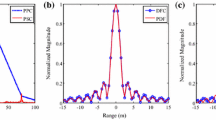Abstract
In order to mitigate the Range-Doppler ambiguities inherent in a sparse aperture, high pulse repetition frequency is adopted to resolve Doppler ambiguous and waveform approach exploits temporal diversity to resolve range ambiguities. In this paper, a novel GA with gradient-like reproduce is presented to optimize multiple bi-phase encoded waveforms, so their peak side-lobe and integrated side-lobe of auto-correlation and cross-correlation are all as lower as possible. The fitness function with adaptive scale gene corresponding to multiple constraint is used to overcome optimal trend. The simulation results are presented to show the performance and behavior of the algorithm proposed.
Preview
Unable to display preview. Download preview PDF.
Similar content being viewed by others
References
Gamham, J., Wainwright, R., Bums, R.: Enabling Research and Development for Flight Dem-onstration of Sparse Aperture Sensing. In: AIAA Space 2001-Conference and Exposition, Albu-querque, NM, vol. 8, pp. 143–147 (2001)
Holland, J.H.: Adaptation in Natural and Artificial Systems, pp. 26–29. Univ, MichiEAn Press, Ann Arbor (1975)
Pham, D.T., Jin, G.: Genetic Algorithm Using Gradient-like Reproduction Operator. Electronics letters IEE 31st 31(18), 1558–1559 (1995)
Skolnik, M.I.: Radar Handbook (In Chinese), 2nd edn., vol. 7, pp. 395–399. Publishing House of Electronics Industry, Beijing (2003)
Liu, Y.T.: Radar Imaging Techniques, vol. 10, pp. 166–171. Harbin industry university press, Harbin (1999)
Somaini, U.: Binary Sequences with Good Autocorrelation and Cross Correlation Properties. IEEE Tranc. on AES 11(6), 634–637 (1975)
Papoulis, A., Pillai, S.U.: Probability Random Variables and Stochastic Processes, 4th edn., pp. 322–345. The McGraw-Hill companies, Inc., New York (2002)
Zhang, W.X., Liang, Y.: Mathematical Foundation of Genetic Algorithms, vol. 5, pp. 106–112. Xi’an Jiaotong University Press, Xi’an (2000)
Baden, J.M., Cohen, M.N.: Optimal Peak Sidelobe Filters for Biphase Pulse Compression. In: IEEE International Radar Conference, 249–252 (1990)
Goodman, N.A., Stiles, J.M.: An MMSE Filter for Range Sidelobe Reduction. In: Proc. of the IEEE International Geoscience and Remote Sensing Symposium, Honolulu, Hawaii, pp. 2365–2367 (2000)
Author information
Authors and Affiliations
Editor information
Editors and Affiliations
Rights and permissions
Copyright information
© 2005 Springer-Verlag Berlin Heidelberg
About this paper
Cite this paper
Tao, Hh., Su, T., Liao, Gs. (2005). Bi-phase Encoded Waveform Design to Deal with the Range Ambiguities for Sparse Space-Based Radar Systems. In: Wang, L., Chen, K., Ong, Y.S. (eds) Advances in Natural Computation. ICNC 2005. Lecture Notes in Computer Science, vol 3612. Springer, Berlin, Heidelberg. https://doi.org/10.1007/11539902_110
Download citation
DOI: https://doi.org/10.1007/11539902_110
Publisher Name: Springer, Berlin, Heidelberg
Print ISBN: 978-3-540-28320-1
Online ISBN: 978-3-540-31863-7
eBook Packages: Computer ScienceComputer Science (R0)




